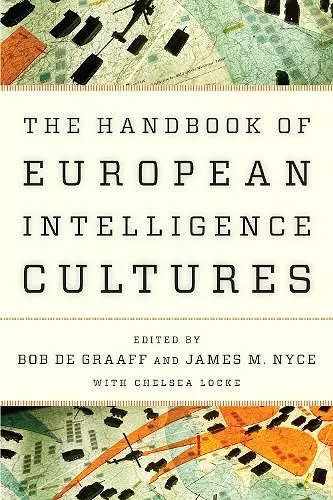Handbook of European Intelligence Cultures
Chelsea Locke author Bob de Graaff editor James M Nyce editor
Format:Paperback
Publisher:Rowman & Littlefield International
Published:2nd Mar '18
Should be back in stock very soon
This paperback is available in another edition too:
- Hardback£121.00(9781442249417)

National intelligence cultures are shaped by their country’s history and environment. Featuring 32 countries (such as Albania, Belgium, Croatia, Norway, Latvia, Montenegro), the work provides insight into a number of rarely discussed national intelligence agencies to allow for comparative study, offering hard to find information into one volume. In their chapters, the contributors, who are all experts from the countries discussed, address the intelligence community rather than focus on a single agency. They examine the environment in which an organization operates, its actors, and cultural and ideological climate, to cover both the external and internal factors that influence a nation’s intelligence community. The result is an exhaustive, unique survey of European intelligence communities rarely discussed.
A precise, country-by-country overview of European intelligence-gathering methods and security initiatives, this analysis reframes spying in the decades following the Cold War and the dismantling of the Berlin Wall and the rise of terrorism. By compiling commentary from 38 contributors, the editors offer differing approaches to surveillance, anti-radicalization, and border control. Charts, such as the investigative setups in Bosnia, Romania, Montenegro, Slovenia, Portugal, and Luxembourg, simplify chain of command and departmental links. Insights into the security measures of 32 countries offer a basis for comparison and for identification of strengths and weaknesses. This unusual survey of European internal defense systems pinpoints the diverse nature of ideological backgrounds and future threats. Each contributor reveals internal elements unique to politics and culture, for example, Estonia’s emerging independence from Russia, Greece’s need for technological direction, and Spain’s foreign policy in the post-Franco milieu. . . . A valuable text for large public libraries and college and university collections. * Booklist *
This useful volume represents a remarkable editorial accomplishment. Editors de Graaff and Nyce have assembled dozens of scholars and persuaded them to adhere to a common thematic framework to produce 32 separate chapters covering nearly every country in Europe. The result is the first systematic scholarly account of Europe’s widely diverse intelligence communities, including those in countries often overlooked, such as Luxembourg, Montenegro, and Iceland. Students of intelligence will find the collection particularly valuable as a reference source. Each chapter introduces the respective cultures of intelligence, as well as notes and references for further reading. . . .[E]very separate study offers insight into how local environmental factors interact with transnational developments to shape the ways that intelligence is defined, organized, and used. Summing Up: Highly recommended. Upper-division undergraduates and above. * CHOICE *
[Y]ou really get an excellent and well-sourced reference book on who is doing what to whom in the European intelligence world, foibles and all. This book is not cheap, but it is worth it if you are serious about knowing the details of the European intelligence scene. * The Spy's Bookshelf *
[This] is an exceptional text, in English, about national intelligence cultures in some of the most influential countries in Europe. This book is not only a relief for mono-lingual intelligence scholars, but a valuable resource for practitioners as well. It provides insights into intelligence issues in countries that would rarely be available to researchers unless they can read a score of foreign languages.... Handbook of European Intelligence Cultures provides a comprehensive coverage of European intelligence communities that is rarely seen in English language publications. It contains an exhaustive list of abbreviations and acronyms, chapter notes and lists of references cited. It makes an exceptional addition to the bookshelves of theoreticians and practitioners alike. * Salus Journal *
This book, part of the Security and Professional Intelligence Education Series (SPIES), is meant to provide detailed information on a number of little-known European intelligence agencies, as well as allow readers to make comparisons regarding the different approaches of the various organizations. For those who think that libraries have too many acronyms, the 15-page list of abbreviations/acronyms in regards to the multitude of European intelligence agencies provided at the beginning of this book is astounding. The editors provide an excellent review of the literature on this topic, examining each tome in detail and why their book is better and more current. The 32 chapters are arranged alphabetically and provide a wealth of information on the following countries and their intelligence agencies. . . .This reference work is an essential addition to any college or university library. * American Reference Books Annual *
This wide-ranging volume will certainly provide students of the subject with much useful information, previously difficult to find, on the intelligence services of Europe, and can be recommended to any library with appropriate interests. * s *
De Graaff and Nyce have performed a valuable service by getting writers on different services to respond to a list of questions on core issues. Perhaps unconsciously, the authors’ responses reveal both similarities and differences—sometimes as much through what they don’t say as what they do. -- Timothy R. Walton, associate professor of Intelligence Analysis at James Madison University, retired CIA officer
ISBN: 9781786606570
Dimensions: 232mm x 154mm x 27mm
Weight: 653g
496 pages